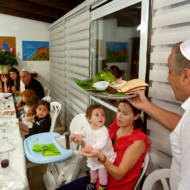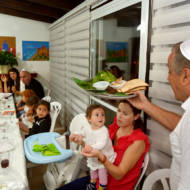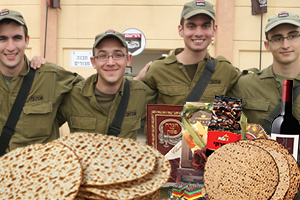
Why is the Invitation to the Poor to Join our Passover Seder Meal Different from All Other Nights?

It’s a mitzvah to invite the poor to our tables, and it applies to every holiday. Why, then, is it only on Passover that we recite a “declaration” of an “open door”?
By Rabbi Ari Enkin, Rabbinic Director, United with Israel
The Passover Seder essentially opens with an announcement, a declaration, that anyone who needs a place to eat and who needs a place to participate in a Passover Seder is welcome to join us. What is both odd and interesting, however, is that this passage is written in Aramaic, unlike the rest of the Haggadah, which is in Hebrew.
Why is this opening passage of the Haggadah in Aramaic?
One answer to this question is simply that Aramaic was the spoken language of the time when this passage found its way into the Haggadah. How could the less fortunate understand our open invitation if it would be announced in a language that they couldn’t understand? Hence this piece, which was for the less learned and less fortunate, was said in Aramaic.
This declaration, however, should not merely be lip service. In ancient times, and even today in some families, people would open the door as they would declare the invitation for anyone to come to join their Seder. What this demonstrates is that our Passover Seder begins with an act of kindness.
This is very important, as Maimonides writes: “When one eats and drinks [on the holidays], one is obligated to feed the stranger, orphan and widow, together with other poor . . . One who locks the doors of his courtyard, however, and eats and drinks together with his children and wife, and does not feed and give drink to the poor and the embittered…[performs no mitzvah]”
Sure, as Maimonides writes, it is a mitzvah (Torah commandment) to invite the poor to our tables. But this is a mitzvah that applies on every holiday! Why is it only on Passover that we recite a “declaration” and an “open door” to go along with it? What about Shavuot and Sukkot? Why no declarations? Why no open door?
It is explained that this gesture and extra effort is especially appropriate on Passover, more than on any other holiday. This is because our sages teach us that it is due to a disregard (“baseless hatred”) for our fellow man that we were sent into exile in the first place. If so, the “cure” to the exile, the redemption, is through acts of kindness (“baseless love”).
With these extra efforts to show love for our fellow man, we are essentially telling God that just as You redeemed us from Egypt, we deserve to be redeemed from this exile once more. Passover is a holiday of exile. Shavuot and Sukkot are not. They are actually holidays of redemption!
So maybe, just maybe, we will help in bringing the final redemption, if, when Elijah the Prophet visits our seder , he sees that we showed care and concern for others.
Send Passover Packages to Needy Israeli Soldiers – Bring Them Joy!
We are honored to thank the young men and women of the IDF who risk their lives to protect the freedom of the citizens of Israel.
Join us in sending Passover food packages (and personal notes) to Israeli soldiers and their families. Bring them Passover joy!
Many soldiers spend the Passover holiday with needy families back home. The soldiers greatly appreciate your love and concern.
CLICK HERE TO SEND YOUR PACKAGE AND NOTE TO ISRAELI SOLDIERS!
The post Why is the Invitation to the Poor to Join our Passover Seder Meal Different from All Other Nights? first appeared on United with Israel.
United with Israel
